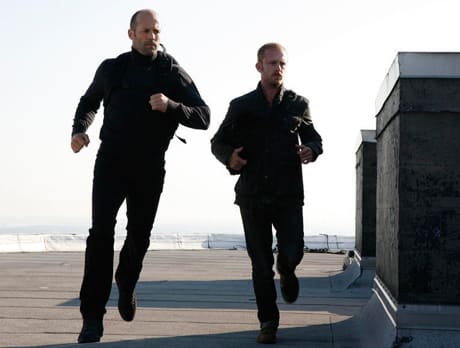A remake of the semi-obscure 1972 semi-classic, this Mechanic subs in the almost hairless Jason Statham for the almost expressionless Charles Bronson as Bishop, the robotically efficient modern-day Ronin, punching the clock for some sleekly mysterious, high-end assassination clearinghouse.
Via a snazzy, entirely implausible prologue whereby yet another central-casting Colombian drug lord is prejudicially dispatched, Bishop's essentials are quickly sketched in: solitary, remorseless, hyper-prepared; he's an aesthete who strays from his lavish fortress of solitude set deep, and inexplicably, in the Louisiana bayou only at sufferance to bankroll his taste for fine art, wines, classical music and general swankery.
Things begin to go pear-shaped for Bishop when, against his macho, lone wolf instincts, he's guilted into mentoring Steve, the slightly sociopathic son of his recently-zotzed guru/boss/avatar McKenna (a wheelchair-bound Donald Sutherland), by way of honourably closing the ersatz father figure circle.
Insofar as he's played by congenitally squirrelly wingnut Ben Foster, Steve introduces a tediously transparent note of impending upset into what is already a fairly heavily signposted arc. Suffice it to say that, after the SAG-mandated training montage — AK-47s and IEDs rather than speed bags and cardio — Bishop's obsessively circumscribed career path slides flamboyantly off the rails. In ways that won't surprise fans of Point Blank or the Bourne franchise, Bishop goes rogue, dodging both Murder Incorporated, represented by go-to weasel Tony Goldwyn, and (for reasons I won't spoil) his new protégé. Much carnage ensues.
Director Simon West has worked mainly in TV since his noisy splash with Con Air and the first Lara Croft, and here sticks with a workmanlike small screen approach, briskly delivering the sound and fury, but largely dispensing with the bourgeois contrivances of inner-life and back-story. Contrast this with The American, whose languorous obsessions with finesse, the Abruzzo countryside and Clooney's abs are nothing but bourgeois contrivances.
Bishop exists, manifestly, on a fuzzy moral plane. The name itself can be read as conferring some kind of ironic gravitas on his rigidly observed (if murderous) outsider ethical code. But grey shades are no longer de rigueur in 2011, and West is obliged to serve up not just a heavier emphasis on the heinousness of Bishop's targets, but also an added, fecklessly nihilism-averse final twist sure to disappoint those who remember the original's brave darkness, as well as those who lament a zeitgeist that requires even its hit man flicks to feel good.
(Alliance)Via a snazzy, entirely implausible prologue whereby yet another central-casting Colombian drug lord is prejudicially dispatched, Bishop's essentials are quickly sketched in: solitary, remorseless, hyper-prepared; he's an aesthete who strays from his lavish fortress of solitude set deep, and inexplicably, in the Louisiana bayou only at sufferance to bankroll his taste for fine art, wines, classical music and general swankery.
Things begin to go pear-shaped for Bishop when, against his macho, lone wolf instincts, he's guilted into mentoring Steve, the slightly sociopathic son of his recently-zotzed guru/boss/avatar McKenna (a wheelchair-bound Donald Sutherland), by way of honourably closing the ersatz father figure circle.
Insofar as he's played by congenitally squirrelly wingnut Ben Foster, Steve introduces a tediously transparent note of impending upset into what is already a fairly heavily signposted arc. Suffice it to say that, after the SAG-mandated training montage — AK-47s and IEDs rather than speed bags and cardio — Bishop's obsessively circumscribed career path slides flamboyantly off the rails. In ways that won't surprise fans of Point Blank or the Bourne franchise, Bishop goes rogue, dodging both Murder Incorporated, represented by go-to weasel Tony Goldwyn, and (for reasons I won't spoil) his new protégé. Much carnage ensues.
Director Simon West has worked mainly in TV since his noisy splash with Con Air and the first Lara Croft, and here sticks with a workmanlike small screen approach, briskly delivering the sound and fury, but largely dispensing with the bourgeois contrivances of inner-life and back-story. Contrast this with The American, whose languorous obsessions with finesse, the Abruzzo countryside and Clooney's abs are nothing but bourgeois contrivances.
Bishop exists, manifestly, on a fuzzy moral plane. The name itself can be read as conferring some kind of ironic gravitas on his rigidly observed (if murderous) outsider ethical code. But grey shades are no longer de rigueur in 2011, and West is obliged to serve up not just a heavier emphasis on the heinousness of Bishop's targets, but also an added, fecklessly nihilism-averse final twist sure to disappoint those who remember the original's brave darkness, as well as those who lament a zeitgeist that requires even its hit man flicks to feel good.




